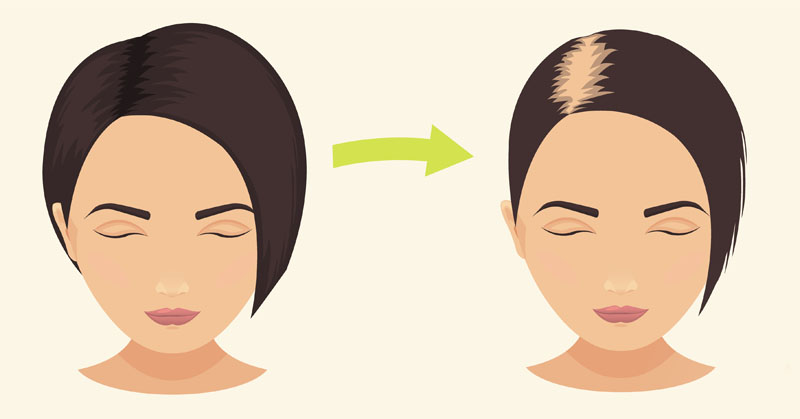Beauty store shelves are full of products that claim to give you the thicker, longer, fuller hair that you desire. Men and women alike often spend hundreds on hair products in order to prevent their hair from thinning. There are many factors that can cause early hair thinning, including heredity, hormonal changes, medical conditions and medications.
While medications may be necessary for certain health problems, many are accompanied with hair loss as a side effect. The types of medications that can cause hair loss and hair thinning include:
- Acne medications
- Antibiotics
- Antidepressants
- Antifungal medications
- Blood thinners (anticoagulants)
- Chemotherapy medications
- Cholestrol-lowering medications
- Epilepsy medications (anticonvulsants)
- High blood pressure medications (antihypertensives)
- Hormone replacement therapy – estrogen or progesterone for women, androgens and testosterone for men
- Immuno-suppressant medications
- Interferons
- Mood stabilizers
- Non-sterodial anti-inflammatory medications (NSAID’s)
- Oral contraceptives
- Parkinson’s disease medications
- Steroids
- Thyroid medications

Natural Remedies For Hair Loss
Hair loss may be your body’s way of telling you there’s a deeper health issue at play. While it’s important to get to the root of the problem, there are several natural treatments that can help with hair thinning.
1. Try Herbs
Saw palmetto and ginko biloba have both been studied for their link to increasing hair density. A study conducted at the Clinical Research and Development Network tested 34 men and 28 women. All were between the ages of 18 and 48. They topically applied saw palmetto extract in lotion and shampoo base for three months. The study found that 35% of the participants showed an increase in hair density. Consequently, ginko biloba is an herb that encourages blood flow and provides and antioxidant boost to the body. It can help strengthen the hair shaft while discouraging hair thinning.
2. Manage Stress
Chronic stress can effect the body in numerous ways. It may affect your heart, your energy level, or your emotions. It can also cause your hair to thin and fall out. Decreasing your daily stress levels will help strengthen your overall health, including the health of your hair. Find a stress-reliever that works for you. Try yoga or another form of exercise, take a daily nature walk, or a nightly bubble bath. Taking care of yourself is vital to your health.

3. Balance Your Hormones
When your hormone levels are out-of-whack, your body can start experiencing various symptoms. One of these symptoms is hair thinning. Getting your hormone levels back in check can stop hair thinning and manage other symptoms. Add some hormone-balancing foods to your diet. These include avocados, nuts, pomegranates, organic apples, and chia seeds.
4. Use Essential Oils
Research has shown that rosemary oil can work as a topical hair loss treatment. It’s one of the top essential oils for enhancing hair growth, with the ability to increase cellular metabolism to stimulate hair growth. Spikenard oil is also known for promoting hair growth and can even be used to slow the process of graying. Last but not least, a mixture of peppermint oil and sage oil can also be used to stop hair thinning. Try mixing 3-4 drops of rosemary, peppermint, and sage essential oils into 1 tablespoon of olive oil or coconut oil. Massage the mixture into the thinning areas 1-2 times per day.

5. Try Natural Supplements
Natural supplements may help with underlying nutrient deficiencies causing thinning hair. Check with your doctor before starting a supplement.
- Take 1 multivitamin each day that contains Vitamins A, C and E, the B-complex vitamins, as well as trace minerals, such as magnesium, calcium, zinc and selenium.
- Vitamin C, 500-1,000 milligrams twice a day as an antioxidant.
- L-lysine, 500-1,000 milligrams a day for hair loss.
- B-complex vitamins, 1 tablet each day to manage stress.
6. Take Cooler Showers
Boston-based transplant surgeon Dr. Ryan Welter advises cooler showers to stop hair thinning. Hot water dehydrates the hair strands, causing dry and brittle hair that’s more prone to snap and fall out. Taking cooler showers can help keep hair strands healthy by preserving moisture.

7. Eat Foods That Help
Many nutrient-dense whole foods can do wonders for hair thinning. If you’re experiencing unwanted hair loss, it may be because your body is low in certain nutrients. Try adding some of these foods to your diet:
- Iron – Improving your iron levels can help stop hair thinning. Add lentils, kale, spinach and other dark leafy greens to your diet.
- Vitamin C – Vitamin C is a powerful antioxidant that helps your body absorb iron. Try guava, grapefruit, kiwi, papaya and broccoli.
- Vitamin A – Foods high in Vitamin A help maintain a healthy scalp. Try pumpkin, kale and sweet potato.
- Zinc – Zinc deficiency has been linked to hair loss. Add grass-fed beef, pumpkin seeds or chickpeas to your diet.
8. Avoid Foods That Hurt
To help prevent hair thinning, avoid toxic and processed foods that can harm your body. These include:
- Sugar – Sugar causes hormone imbalances and inflammation which can lead to hair loss.
- Alcohol – Alcohol increases inflammation and causes liver toxicity, causing hair loss.
- Caffeine – Too much caffeine can lead to dehydration and hormone imbalances.
- Trans Fatty Acids – Trans fats increase inflammation in the body which can lead to hair loss. Avoid vegetable oil, corn oil and soybean oil.
Sources:
Dr. Axe
Dr. Axe
Prevention
NCBI
BBC Good Food
NCBI
Mayo Clinic
American Hair Loss


